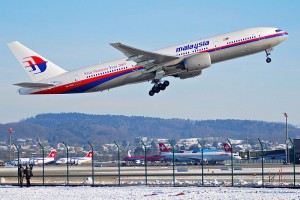This piece was reprinted by OpEd News with permission or license. It may not be reproduced in any form without permission or license from the source.
Cross-posted from Consortium News
Given the fog of war and the eagerness among the various participants to wage "information warfare," there is also the possibility that evidence -- especially electronic evidence -- might be tampered with to achieve some propaganda victory.
For their part, the separatist rebels in eastern Ukraine denied responsibility for the crash -- saying they lacked anti-aircraft missiles that could reach the 33,000-foot altitude of the Malaysian airliner -- but there are reasons to suspect the rebels, including their previously successful efforts to shoot down Ukrainian military aircraft operating in the war zone.
On Thursday, Russian President Vladimir Putin deflected questions about who may have fired the missile as he called for an international investigation. But he made a telling point when he noted that the "tragedy would not have happened if military actions had not been renewed in southeast Ukraine."
Those likely to agree with that statement include German Chancellor Angela Merkel and French President Francois Hollande who, during a lengthy four-way conference call with Poroshenko on June 30, tried desperately to get him to prolong the ceasefire. Only the U.S. voiced support for Poroshenko's decision to spurn that initiative and order Ukrainian forces into a major offensive in the east.
It was in the context of Ukrainian forces using their airpower to strike rebel positions that led to the rebels' efforts to neutralize that advantage by deploying anti-aircraft missiles that have achieved some success in downing Ukrainian military planes. The Ukrainian military is also known to possess anti-aircraft batteries scattered throughout the country.
Raw Meat for Russia Bashing
But the chance to further demonize Putin and Russia will be hard for Official Washington and its corporate-owned press to resist. The New York Times was quick out of the starting blocks on Friday with a lead editorial blaming the entire Ukraine conflict, including the Malaysian Airline tragedy, on Putin:
"There is one man who can stop it -- President Vladimir Putin of Russia, by telling the Russian-backed separatists in eastern Ukraine to end their insurgency and by stopping the flow of money and heavy weapons to those groups."
Among Putin's alleged offenses, according to the Times, has been his "failing to support a cease-fire and avoiding serious, internationally mediated negotiations" -- though Putin has actually been one of principal advocates for both a cease-fire and a negotiated solution. It has been the U.S.-backed Poroshenko who canceled the previous cease-fire and has refused to negotiate with the ethnic Russian rebels until they essentially surrender.
But the death of all 298 people onboard the Malaysian Airline flight, going from Amsterdam to Kuala Lumpur, will surely provide plenty of fuel for the already roaring anti-Russian propaganda machine. Still, the U.S. press might pause to recall how it's been manipulated by the U.S. government in the past, including three decades ago by the Reagan administration twisting the facts of the KAL-007 tragedy.
In that case, a Soviet fighter jet shot down a Korean Air Line plane on Sept. 1, 1983, after it strayed hundreds of miles off course and penetrated some of the Soviet Union's most sensitive airspace over military facilities in Kamchatka and Sakhalin Island.
Over Sakhalin, KAL-007 was finally intercepted by a Soviet Sukhoi-15 fighter. The Soviet pilot tried to signal the plane to land, but the KAL pilots did not respond to the repeated warnings. Amid confusion about the plane's identity -- a U.S. spy plane had been in the vicinity hours earlier -- Soviet ground control ordered the pilot to fire. He did, blasting the plane out of the sky and killing all 269 people on board.
The Soviets soon realized they had made a horrendous mistake. U.S. intelligence also knew from sensitive intercepts that the tragedy had resulted from a blunder, not from a willful act of murder (much as on July 3, 1988, the USS Vincennes fired a missile that brought down an Iranian civilian airliner in the Persian Gulf, killing 290 people, an act which President Ronald Reagan explained as an "understandable accident").
But a Soviet admission of a tragic blunder regarding KAL-007 wasn't good enough for the Reagan administration, which saw the incident as a propaganda windfall. At the time, the felt imperative in Washington was to blacken the Soviet Union in the cause of Cold War propaganda and to escalate tensions with Moscow.
Falsifying the Case
(Note: You can view every article as one long page if you sign up as an Advocate Member, or higher).






